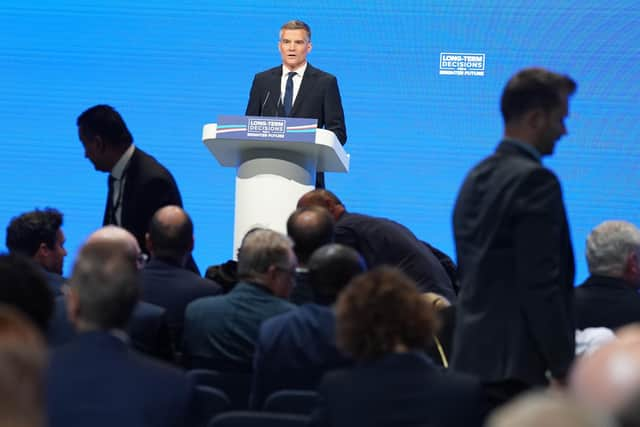Why is Mark Harper embracing crackpot theories like ‘15-minute cities’? - David Behrens
Rumours and half-truths are amplified to the point where they become accepted fact or even received wisdom.
Wisdom was certainly in short supply in Manchester, where the Conservatives have just wrapped up their annual conference. But no-one expected the party of government to go so far as to propagate an internet myth as official policy.
Advertisement
Hide AdAdvertisement
Hide AdThe Transport Secretary Mark Harper was presumably so desperate to avoid addressing the problem of HS2 that he changed tack to something that wasn’t a problem at all, until he made it one.


You can see why. It’s easy to put right something that hasn’t gone wrong and to earn kudos for doing so. Thus, he unleashed an attack on the erosion of civil liberties that had arisen from local councils telling us how often we can go to the shops and rationing our use of the public highways by means of CCTV.
If you didn’t know this was happening, his rhetoric might have stopped you in your tracks. But are we sure it’s happening? If so, why haven’t we heard about it before?
The fact is, Mr Harper had fallen for an absurd conspiracy theory which holds that some unseen force is trying to restrict our movements. It’s a political stratagem straight out of the Donald Trump playbook: find a made-up ‘fact’ and use it to exploit people’s fears and prejudices.
Advertisement
Hide AdAdvertisement
Hide AdThe minister singled out “so-called 15-minute cities” as the source of this threat to us all. He was referring to a notion popularised by European town planners that everyday destinations like schools, shops and offices should be within a short walk or bike ride from home.
That’s all they are suggesting. The worst that can be reasonably said is that it’s pie in the sky. But search online and you’ll find it’s a doomsday scenario of open-air prisons and silos created to keep us in our place.
Mr Harper isn’t the only mainstream politician to have swallowed this. Nick Fletcher, the Conservative MP for Yorkshire’s Don Valley, told the Commons in February that 15-minute cities were an “international socialist concept”.
Perhaps the critics have confused the scheme with a different and uniquely British idea known as low-traffic-neighbourhoods. These are supposed to discourage cars by closing some roads to them, with CCTV cameras identifying transgressors.
Advertisement
Hide AdAdvertisement
Hide AdThere are 300 of these in use or on the way, including in Sheffield. Their supporters say they cut noise and pollution, while critics believe they succeed only in shifting traffic problems from one area to another. As Transport Secretary, it was literally Mr Harper’s job to know that. Instead he told the Tory faithful that 15-minute cities were “sinister” and “shouldn’t be tolerated”. He went on to say that councils were guilty of “overzealous traffic management”, which we all know to be true but it’s a different issue entirely.
So by manufacturing a controversy over nothing he reduced the government to the level of an embittered teen on the dark web, spewing forth bilge about fake moon landings and vaccines with homing devices.
The Local Government Association, which speaks for Town Halls, didn’t help by responding that “councils know their communities best”, an assertion that will surprise anyone who has ever dealt with one.
The fake indignation obscures a real issue in many communities, namely that amenities which really should be less than 15 minutes away – healthy food, for instance – are actually nowhere near.
Advertisement
Hide AdAdvertisement
Hide AdEarlier this year it emerged that in Bradford nearly two thirds of low income families live in “food deserts” with little or no access to fresh fruit or veg. It’s a similar story in other deprived towns whose residents might be forgiven a degree of cynicism towards hollow promises of levelling up. HS2 on the doorstep? A branch of Morrisons would be a start.
So let’s put things in perspective. 15-minute cities are nothing but an idea – and a much better one than HS2, whose tragedy is not that it won’t be finished but that it was ever started, at least in its current form.
It was ironic that Mark Harper’s boss had to denounce fake narratives as he defended cancelling the new train line to the North. A “false consensus” had emerged, the PM said, “driven by cities at the exclusion of everywhere else”.
Mr Harper does have a point about aggressive traffic restrictions and I’m glad he’s cracking down. But in embracing crackpot theories from the internet he is taking us for a ride.